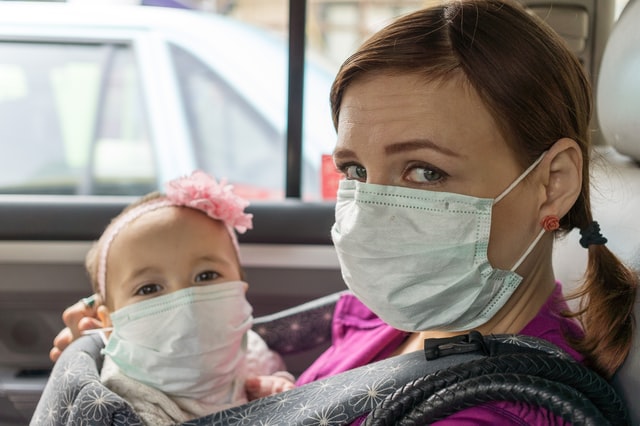
Given recent spikes in COVID-19 caseloads, an economic crisis that continues to deepen, and an upcoming school year faced with daunting challenges, it is critical that Congress quickly pass additional emergency relief to support struggling children and families that both mitigates the impact of our current crisis as well as addresses inequities that existed before the COVID-19 pandemic
New research finds that the Coronavirus Aid, Relief, and Economic Security (CARES) Act, specifically expansion to unemployment benefits and the establishment of one-time Recovery Rebate payments, may have prevented child poverty in the United States from spiking. While this is encouraging, these findings also recognize that many children and families continue to face significant hardship in many aspects of their lives due to the fact that the expansion of unemployment benefits has expired, some families are still waiting to access assistance, and many find themselves ineligible for benefits, as is the case for millions of children in immigrant families.
Additional, comprehensive support is needed immediately to extend and expand on the assistance provided in the CARES Act to address all of the ways this outbreak is affecting child well-being in the United States. For example, we know from recent Census data that nearly 20 percent of adults with children reported that children in the house were not eating enough because they could not afford enough food, and nearly 30 percent of adults who live with children are behind on rent, more than double the rate for adults not living with children.
The Health and Economic Recovery Omnibus Emergency Solutions Act (HEROES Act) passed in the House on May 15, 2020, and included some critically important and timely assistance for struggling children and families, including income support, nutrition assistance, healthcare, and more, while also falling short for children in some areas such as child care assistance. After a two month delay, Senate Republican leadership released the Health, Economic Assistance, Liability Protection and Schools (HEALS) Act, which takes some steps in helping children and families, but has significant shortcomings, including being released too late to prevent the expiration of important supports including the expansion of unemployment insurance benefits.
The recent Memoranda and Executive Order introduced by the President fail to address the needs of children during this crisis and therefore, even if they are implemented, it is imperative that Congress acts quickly.
First Focus Campaign for Children recently sent this letter to Congress urging them to act quickly and pass a package of assistance that extends and provides additional robust relief for households with children.
Below are some of our top priorities that we expressed to lawmakers:
Nutrition Assistance
- Increase SNAP: Increase the Supplemental Nutrition Assistance Program (SNAP) maximum benefit by 15 percent. The poorest families already receive the maximum amount and so it is essential to increase benefit levels for these families with little or no income. In addition, SNAP work requirements must be waived for college students.
- Extend Pandemic Emergency Benefit Transfers (Pandemic EBT): Extend the Pandemic EBT program through school year 2020-2021 as well as permit additional distribution sites.
Health
- Increase Medicaid FMAP: Increase the FMAP for Medicaid to at least 12 percent to provide fiscal relief to state Medicaid offices while millions more children and adults are eligible for Medicaid.
- Postpone CHIP FMAP Reduction: Postpone the upcoming final reduction of the enhanced E-FMAP for CHIP by 11.5 percent on October 1, 2020. Maintaining the current E-FMAP continues the administrative and fiscal status quo for Medicaid programs that are on the front lines of addressing the current COVID-19 crisis and provides additional resources to states and local governments.
Income Supports
- Expand Existing Refundable Tax Credits: Expand the successful Child Tax Credit (CTC) and the Earned Income Tax Credit (EITC) to provide some permanent financial stability, delivered on a monthly basis, to households with children that have low- to moderate-income or no income. A CTC expansion should make the credit fully refundable increasing it to at least $3000 per child per year, create a more generous young Child Tax Credit (at least $3600 per child per year), include all children regardless of immigration status, designate 17-year olds as “qualifying children,” establish equity for children in U.S. territories, and make payments on a regular monthly basis when household bills regularly come due.
- Provide Emergency Assistance: Establish an emergency assistance fund of at least $10 billion for children and families, including children being cared for by kin, by including the Pandemic TANF Assistance Act (S. 3672) in any final package. This legislation not only includes an emergency assistance fund, but also suspends the requirement for state programs to comply with the Work Participation Rate and federal benefit time limit.
- Create Equity for Children in Recovery Rebate Payments: Establish equity in the current “recovery rebate” program to ensure all children and young adults, regardless of age and immigration status, receive the same rebate as adults.
- Extend the $600 Per Week Increase to UI Benefits: Continue the current $600 in UI benefits for both Federal Pandemic Unemployment Compensation and Pandemic Unemployment Assistance through at least until the beginning of next year, but ideally, an extension should be tied to economic conditions and expire well after the pandemic itself is addressed.
- Extend Paid Leave: Extend paid sick days and paid family and medical leave to all workers with full wage replacement, regardless of employer size.
Address and Prevent Child, Youth, and Family Homelessness
- Increase support to children and families experiencing homelessness in all forms: Include the bipartisan Emergency Family Stabilization Act (S. 3923/H.R. 7950) in any final negotiated package, which provides flexible funding for community-based organizations to meet the unique needs of children, youth, and families experiencing homelessness (as defined by the education subtitle of the McKinney-Vento Act) in the wake of the coronavirus. This funding could be used for shelter and housing needs, including motel vouchers, as well as health and safety needs including hygiene needs and mental health services. These funds would be available through September 2021.
- Institute a moratorium on all evictions and utility shut offs nationwide: Institute a moratorium on all evictions nationwide, including from hotels and motels as well as all utility shut offs. This moratorium should freeze all existing eviction orders and eliminate late fees for back rent owed.
Support Immigrant Families
- Make ITIN filers eligible for past and future rounds of stimulus checks: Social Security numbers are required to be eligible for the recovery payments provided in the CARES Act, meaning many immigrant families do not qualify, including households with children who are U.S citizens. Congress should ensure all families and children have access to this cash benefit as well as future rounds of payments during this historic public health and economic emergency to help pay for everyday needs such as food, housing, utilities, and more.
- Clarify that immigrants can receive Medicaid coverage for COVID-19 testing, treatment, and vaccines: Clarify that those are ineligible for full-scope Medicaid due to immigration status–but who meet other Medicaid eligibility requirements–can receive coverage for COVID-19 testing, treatment and vaccines through Emergency Medicaid.
- Extend All Work Permits: Automatically extend work permits for individuals with Deferred Action for Childhood Arrivals (DACA) status or Temporary Protected Status (TPS) as well as for all other immigrant and nonimmigrant visas.
- Provide Funding for U.S. Citizen and Immigration Services (USCIS) – Prevent the furlough of much of the USCIS workforce and allow for green cards, DACA applications, and other immigration paperwork to continue to be processed. This funding must include guardrails to ensure that the costs of immigrating aren’t exorbitantly high, that the money does not go to enforcement proceedings, and that USCIS is transparent with their application of the funds.
Early Childhood
- Stabilize Child Care: The CARES Act provided $3.5 billion as a down payment for child care through increased funding for the Child Care and Development Block Grant. This was an encouraging start, but does not address the comprehensive needs of the child care field right now. An investment of $50 billion is needed in flexible, dedicated child care funding to support providers, workers, families, cover health and safety needs, pay for supplies, and provide virtual learning.
- Provide Maternal, Infant, and Early Childhood Home Visiting (MIECHV) program funding: Prioritize a one-time $100 million appropriation for MIECHV. These funds can be used to train home visitors to deliver services through technology that enables home visits from a distance, as well as tangible needs for families including technology, formula, and diapers.
Education
- Prioritize Public Schools: Make sure that public schools, facing massive budget shortfalls this coming year due to tax revenue shortages, get the necessary support. Some estimates have projected 1.9 million teachers may lose their jobs. With the difficult transition to online learning, we need experienced teachers more than ever to support students. The Coronavirus Child Care and Education Relief Act (CCCERA) allocates $175 billion to K-12 schools, a necessary first step to prevent massive education budget cuts stemming from state revenue losses that may amount to over $500 billion through 2022.
- Empower Districts, Local Stakeholders, and Communities to Make Decisions: Tying two-thirds of funds to reopening puts schools in a difficult place: provide quality education or prolong reopening until it is safe. It should not be a binary. Schools providing online learning will still need the support of federal funds, and the decision to reopen should be made based on conditions in communities — like local infection rates — by local experts.
Juvenile Justice
- Increase Juvenile Justice and Delinquency Prevention Programming: Appropriate $100 million to prevent and mitigate the COVID-19 risks for justice-involved youth. These funds should remain available until September 30, 2021, to prevent, prepare for, and respond to coronavirus, of which $75,000,000 shall be granted to state and local agencies for juvenile delinquency programming authorized by section 221 of the Juvenile Justice and Delinquency Prevention Act of 1974, and $25,000,000 for delinquency prevention, as authorized by section 504 of the Act.
- Incentivize States to Release Youth from Detention Facilities: Incentivize states and localities to release detained youth by increasing the FMAP by 2 percent for any state or jurisdiction that enacts widespread policies that release 10 percent or more of their state prison and youth detention population. Allows states to receive an additional one percent increase in FMAP for working with local jurisdictions to release 15 percent or more of their local jail population for the duration of the pandemic. These states and local jurisdictions can remain eligible for an increased FMAP if they maintain these decreases after the immediate COVID-19 crisis has passed.
Child Welfare
- Allow States to Use Federal Child Welfare Funding to Create, Operate, and Publicize an Independent Foster Youth Ombudsman: The headline-grabbing details of assaults and fatalities that babies, children, and youth in foster care have endured during the pandemic demonstrates the unquestionable need for every foster youth to have access to an individual/agency that independently will hear them, listen to them, and act to promote their safety, well-being, and permanency.
- Modify the Family First Prevention Services Act in order to Sustain a Commitment to Prevention and Help Keep Children Safe and Out of Foster Care: Congress should apply the FMAP increase to prevention funding now; remove the state match requirement for one year to Title IV-E prevention services; expand the scope of allowable prevention services to include evidence-based services that prevent or mitigate the effects of domestic violence, economic insecurity, and challenges facing children of incarcerated or re-entering parents; and extend for one year the option for states to claim transitional payments for services and associated costs under the Title IV-E prevention program.
2020 Decennial Census
- Safeguard the 2020 Census to Ensure All Kids Are Counted: Congress must ensure that the U.S. Census Bureau continues operations of the 2020 decennial Census past September 30, 2020, as well as extend the statutory reporting deadline for apportionment data to April 30, 2021, to ensure a full and accurate count of all children and that Congressional districts that provide full representation for all.



